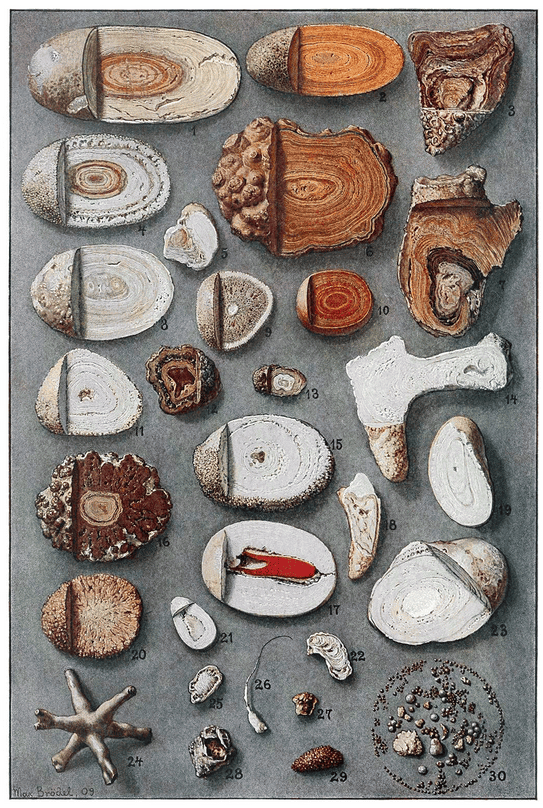Urinary Stones
 Various Urinary Calculi
Various Urinary CalculiDiseases of the Kidneys, Ureters and Bladder, Burnam, 1914
Urinary Stones include Gravel and Stones of the Bladder and Kidneys. In all systems it was generally agreed that a sticky or thick part of the urine would be dried to form stones, this drying effect coming from Wind. So Wind and Phlegm (or Damp) are the primary Humoral causes of Gravel and Stones. Excess Heat, especially with dehydration can also thicken the urine to allow for the breeding of Stones.
In practice, the diseases is divided into Hot (Damp-Heat) and Cold (Damp-Cold) types:
- Stones from Heat: reddish-yellow urine with much sand in it when left to settle. The sand is reddish and hard when touched. Tongue is red with yellow coating and a full or fast pulse.
- Stones from Cold: clear or pale yellow urine, white gravel in the urine, pale face and tongue, low or slow pulse.
|
Western Tradition Simples
Simple Remedies 1. Lemon juice in water every morning can help. Whe.n the patients feels pain, take Lemon juice (1 oz.), Malmsey Wine (3 oz.), mix and take as a dose. 2. Madder powder in doses of 1–3 grams twice daily has been proven to be very effective. 3. Take 3 drams of Cassia Fistula daily before dinner ‘he shall never have the Gravel’. (The Secrets of Alexis, 1615) 4. When there is pain from Stones, mix 1 ounce of the juice of Green Lemons with 3 oz. of Malmsey wine and take in one dose. (The Secrets of Alexis, 1615) 5. Celery seed, Parsley seed (equal parts). Powder and take with wine. 6. Take Bean pods, burn to ashes and soak in water, then strain and drink. (Brunschwig, 1561) 7. Boil Horseradish root (1 kg) in water and use as a Sitz bath (bath to sit in). Also drink Horseradish water. 8. Take Radish roots, cut off the top, hollow them out, then sit them in soil with the top replaced. A water will collect inside which is very effective for Strangury and Bladder Stones. (Brunschwig, 1561) 9. Ivy berries powdered in 1–2 dram doses taken with wine. 10. Take 10 spoonfuls of Rue water every morning for 15 days, it can be sweetened if needed. 11. Dried Goat Blood taken in a dose of 2 drams with wine before bed. It ‘breaks’ stones. Rabbit and Hare Blood was said to be equally effective. 12. Hare or Rabbit Kidney, dried and powdered in doses of 1 dram with Parsley water, Horseradish water, or wine. (Brunschwig, 1561) 13. A Rabbit or Hare burnt to ashes (1 ½ oz.), Honey (6 drams). Make an Electuary. Take as much as a Chestnut every morning. Lapidem frangunt Break Stones Decoction for Stones Dialacca Major (Mesue) Dialacca Minor (Mesue) Powder for Kidney Stones from Heat (Unani) Powder for Stones Stone–Breaking Powder (Lithontripticon) (Nicholas) Powder of Three Peppers (Diatrionpipereon) Troches of Winter Cherry (Trochisci Alkekengi) (Mes.) Troches of Winter Cherry (Unani) Pilulae Aggregative majores Pills to Crumble Kidney Stones (Unani) Confection of Ashes Electuary for a Duke (Electuarium Ducis) (Nicholas) The Queen of Colen’s Electuary Electuary of Scorpion (Unani) Electuary of Seeds Electuary for Stones (Azaricon) Diasulphur Justinum Nicolai Philantropos Nicolai Nephrocatharticum Nicolai Opopyra Magna Nicolai Mithridate Oil of Bitter Almond Oil of Cherry kernels Oil of Scorpions For the Pain of Kidney Stones Philonium Persicum Requies (Nicholas) |
TCM Classification Note: In TCM, Lysmachia Jin Qian Cao is regarded as a specific for both urinary and gall stones. It is often used in large doses in decoctions for stones and may be added to various different formulas depending on the diagnosis. Heat and Damp Ba Zheng San Niao Lu Pa Shi Tang |
Special Formula
|
1. WATER FOR STONES Pellitory of the wall, Saxifrage Wild Thyme Parsley 1 handful each Radish roots sliced, 4 or 5 Fennel seed 4 spoonfuls Steep overnight in a gallon of Milk. Distil the next day. Take 4 spoonfuls of this water with 3 spoonfuls of white wine sweetened with a little sugar. Take for 3 days before the Full and New Moons. (Natura exenterata, Philiatros, 1655) |
Research
–Dietary Plants for the Prevention and Management of Kidney Stones: Preclinical and Clinical Evidence and Molecular Mechanisms
–Anti-urolithiatic unani drugs–A review
–Bio-active compounds from unani medicinal plants and their application in urolithiasis
–Unani concept of nephrolithiasis (hisat-e-kulyah) and its management: An overview
–The Successful Management of Mutrashmari (Urolithiasis) Using Proprietary Ayurvedic Medicines: A Case Series
–Identification of medicinal plants for the treatment of kidney and urinary stones
–A randomized open label clinical trial of Khar-E-Khasak (Tribulus Terrestris Linn.) in the management of Hisat-Ul-Kuliyah (Nephrolithiasis)
–Medicine and Nephro-urology in Ancient Iran: Part III: Rhazes and His Recommendations for Nephrolithiasis
